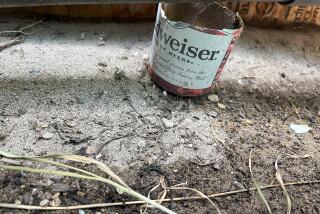Bar on Foreign Sales of Banned Pesticides Urged : Imported Foods Found to Contain Chemicals That Are Illegal in U.S.
- Share via
WASHINGTON — Traces of two pesticides banned in the United States have been found in imported coffee, carrots, pineapples, meat and other food products, showing that U.S. consumers are endangered by chemical companies’ sales of such products overseas, the environmental group Greenpeace charged in a report released Tuesday.
“If these products are too toxic to be used here, they are too toxic to be used anywhere,” Sandra Marquardt, a Greenpeace activist, said at a news conference.
The group criticized what it called a “circle of poison” that infects the food chain, from polar bears to dolphins, and asked Congress to prohibit the production for sale abroad of chemicals suspected of causing cancer.
Few Imports Tested
Because only 1% to 2% of all produce entering the United States is tested, the extent of contamination is unknown, Marquardt said. But last year, the report said, two shipments of Honduran beef totaling 40,000 pounds were found to contain eight times the allowable levels of chlordane and heptachlor, which are banned in the United States.
Contamination has also been found in some fruits, cheese and garbanzo beans.
In some countries that import large quantities of food from nations in which U.S.-banned chemicals are commonly used, mother’s milk has been found to contain 15 to 150 times the level of the pesticides allowed in cow’s milk in the United States, the report said.
Greenpeace singled out Velsicol Chemical Corp., the sole producer of chlordane and heptachlor, for criticism of its overseas marketing. The report said that the Chicago-based company has exported 5 million pounds of the pesticides to two dozen countries over the last two years.
Firm Defends Products
Velsicol spokeswoman Donna Jennings responded that, although the chemicals have been banned in the United States because of health concerns, they are safe and pose no threat to consumers.
“Greenpeace is not basing their charges on science,” she said. “It’s garbage.”
But the environmental organization said that Congress will not be providing effective protection until it expands the chemical ban.
“Congress must stop the production and sale of pesticides that cannot be sold in the U.S.,” Marquardt said. “These products are showing up in our food.”
About 50 countries have banned or restricted the use of the pesticides, the report said.
They are used commonly in Third World countries that do not monitor chemicals extensively and need economical pesticides to maximize their agricultural production, the report said.
The Environmental Protection Agency barred most agricultural uses of the chemicals in 1978 after studies of their potentially carcinogenic effects. In 1988, the company halted all domestic sales under an agreement with the government.
More to Read
Sign up for Essential California
The most important California stories and recommendations in your inbox every morning.
You may occasionally receive promotional content from the Los Angeles Times.













